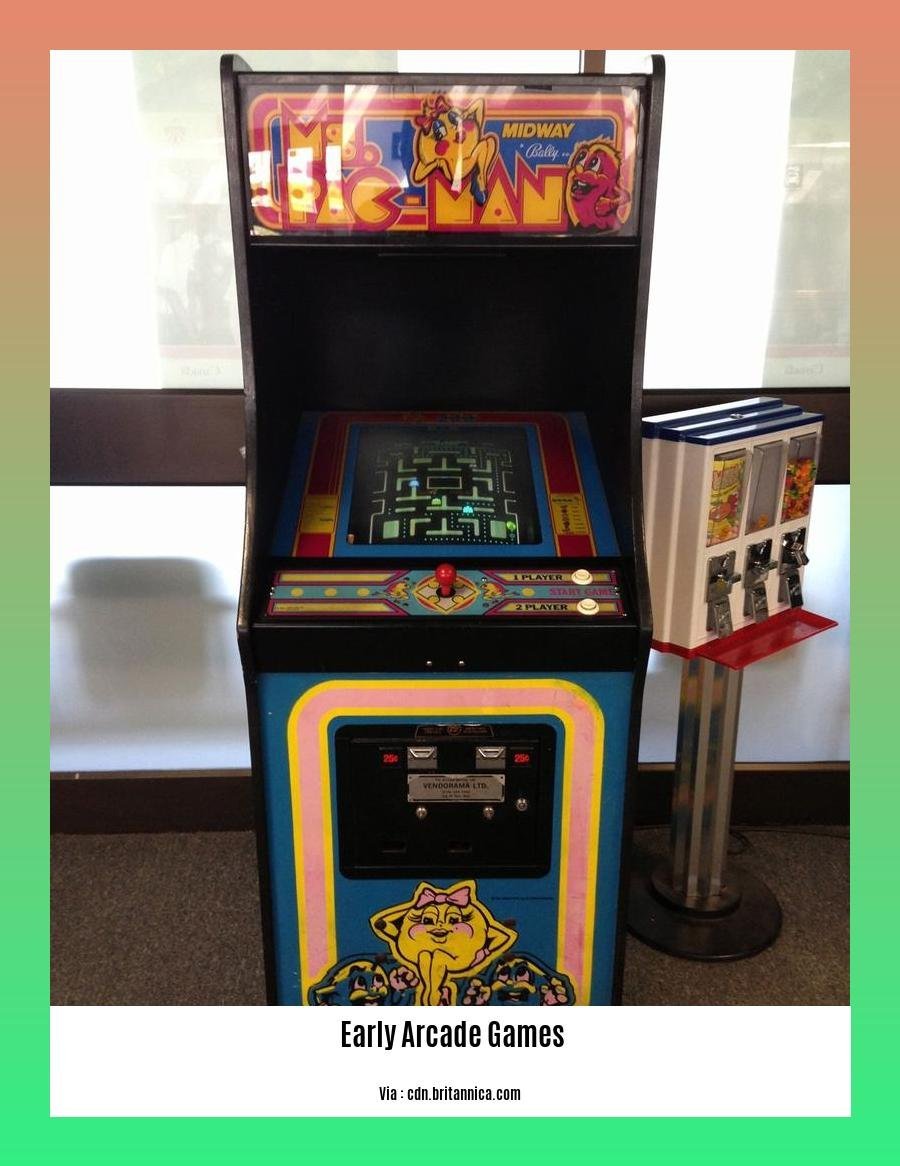Journey back to the golden era of gaming with “A History and Retrospective on Early Arcade Games: The Golden Era of Gaming.” Delve into the origins, evolution, and cultural impact of these iconic titles that laid the foundation for the modern gaming industry. From the addictive simplicity of Pong to the groundbreaking graphics of Donkey Kong, join us as we explore the captivating world of early arcade games and their enduring legacy.
Key Takeaways:
- Early arcade games, such as Skee-Ball, Pinball, and Pac-Man, played a significant role in the history of gaming.
- “Computer Space” (1971) marked the birth of arcade video games.
- Arcade video games evolved from simple dot-and-paddle gameplay to more complex experiences.
- The late 1990s marked the peak popularity of arcade video games.
Early Arcade Games: The Dawn of Digital Entertainment

Prepare to embark on a nostalgic journey as we delve into the depths of early arcade games, a testament to the humble beginnings of the gaming industry. These pioneers laid the foundation for the vibrant world of digital entertainment we enjoy today.
Arcade games were the first to introduce us to the magic of interactive gaming. Their simple yet addictive gameplay, coupled with vibrant graphics and catchy tunes, captivated an entire generation. From the iconic Pac-Man to the strategic Tetris, early arcade games sparked a gaming revolution.
Birth of an Industry
The tale of early arcade games begins in the early 1970s with the introduction of “Computer Space,” the first arcade video game. It was a time of technological limitations, but these constraints inspired ingenious game designs. Games like Pong and Asteroids showcased the power of simple yet engaging mechanics.
The Golden Age
The 1980s witnessed the golden age of early arcade games. The release of Pac-Man in 1980 sent shockwaves through the industry and became one of the best-selling games of all time. Its adorable characters, vibrant colors, and addictive gameplay made it an instant classic. Other iconic titles from this era include Donkey Kong, Frogger, and Galaga, each with its unique charm.
Cultural Impact
Early arcade games left an undeniable mark on popular culture. They fostered a sense of community as people gathered around cabinets to compete or collaborate. Arcades became social hubs where friendships were forged and rivalries were born. The iconic pixelated graphics and catchy soundtracks of early arcade games continue to inspire generations.
Technological Advancements
Early arcade games pushed technological boundaries, laying the groundwork for the future of gaming. From the vector graphics of Battlezone to the 3D polygons of Virtua Fighter, these games showcased the rapid advancements of the time.
Table: Early Arcade Game Timeline
| Game | Release Year |
|---|---|
| Skee-Ball | 1908 |
| Pinball | 1931 |
| Tennis for Two | 1958 |
| Spacewar! | 1962 |
| Pong | 1972 |
| Pac-Man | 1980 |
| Tetris | 1984 |
| Dance Dance Revolution | 1998 |
The Legacy Lives On
While the era of early arcade games may have passed, their legacy endures. Many classics have been ported to home consoles and mobile devices, allowing us to relive the golden days. Moreover, modern games often draw inspiration from these pioneers, ensuring that the spirit of early arcade games continues to inspire innovation and entertain generations to come.
To better understand the origins of the gaming industry, embark on a captivating journey through the history of video games.
Delve into the fascinating evolution of home entertainment with our comprehensive account of home console development.
Immerse yourself in the competitive world of esports and witness the rise of professional gaming.
Impact of Arcade Games on Popular Culture

Socialization:
Arcades were social hotspots! It was a place to connect with fellow players, make new friends, and share the excitement of gaming together. The communal atmosphere fostered a sense of camaraderie and community.
Trends and Fashion:
Arcade culture inspired trends and fashion that transcended the gaming scene. From Pac-Man t-shirts to flashy joysticks, arcade-themed clothing and accessories became popular, reflecting the growing influence of gaming culture in mainstream fashion.
Film and Television Influence:
Arcade games left an indelible mark on the entertainment industry. Films like “Tron” and “Pixels” celebrated the golden age of arcade gaming, while TV shows such as “Stranger Things” and “The Big Bang Theory” incorporated arcade elements into their storylines, showcasing the enduring cultural appeal of these classic games.
Musical Impact:
The rise of arcade culture gave birth to iconic soundtracks and video game-themed music. Composers like Namco’s Junko Ozawa and Sega’s Yuzo Koshiro crafted catchy tunes that added depth and excitement to gameplay, boosting the popularity of video game music.
Key Takeaways:
- Arcades fostered social connection and provided a communal space for shared gaming experiences.
- Arcade culture sparked fashion trends and influenced mainstream aesthetics, reflecting its popularity and cultural impact.
- Arcade games inspired films and television shows, showcasing their enduring cultural relevance.
- Video game music became a notable genre, influenced by the arcade experience and fueled by iconic soundtracks.
Sources:
- How Did Arcades Become Popular? A Deep Dive into the Evolution
- Arcade Games and Cultural Impact
Legacy and Preservation of Arcade Games
In the era of digital gaming, the captivating allure of early arcade games remains etched in the hearts of gaming enthusiasts. These classics laid the foundation for modern video games, introducing iconic characters, addictive gameplay, and the communal spirit of the arcade experience.
Digital Relics: Preserving the Past
With the decline of physical arcades, the preservation of arcade games has become paramount. Through emulation, hardware restoration, and community initiatives, these digital relics are being meticulously preserved for future generations. Emulators allow players to experience arcade classics on modern platforms, while hardware restoration breathes new life into original arcade cabinets. Additionally, the gaming community actively contributes to preserving these games through digital archives and fan translations.
Reimagining and Reinterpreting
Beyond preservation, artists and industry professionals are reimagining and reinterpreting arcade games. Innovative uses of arcade hardware and software include hacking, circuit bending, and repurposing for contemporary art installations. Artists are exploring the aesthetics and mechanics of early arcade games in unique and thought-provoking ways, pushing the boundaries of interactive art.
Legacy and Influence: Shaping the Future
The legacy of arcade games continues to shape the future of gaming. Modern titles often draw inspiration from arcade classics, incorporating their core gameplay mechanics and design principles. The vibrant colors, simple controls, and addictive nature of arcade games continue to captivate players of all generations.
Key Takeaways:
- Arcade games played a pivotal role in the history of video gaming.
- Preservation efforts ensure the legacy of arcade games for future generations.
- Artists and professionals are reimagining arcade games through innovative uses of hardware and software.
- Arcade game mechanics continue to influence modern game design.
Relevant URLs:
The Enduring Appeal of Early Arcade Games
Do you recall the exhilaration of navigating Pac-Man’s maze or battling space invaders in the arcade classics? Early arcade games captured our hearts and continue to resonate with us today. Their allure transcends time, so let’s delve into the enduring appeal of these digital wonders.
Captivating Visuals: From Pixels to Icons
Arcade games burst onto the scene with eye-catching graphics, pushing the boundaries of technology. Pixels danced on screens, creating iconic images like Pac-Man’s yellow circle and Donkey Kong’s mischievous grin. These visuals, while primitive by today’s standards, had a raw charm that etched themselves into our memories.
Addictive Gameplay: Simple Yet Compelling
Early arcade games mastered the art of simple yet addictive gameplay. From Pong’s minimalist paddle battles to Pac-Man’s chase and escape, players found themselves hooked for hours. The games’ straightforward mechanics allowed for quick mastery and endless replayability. Simplicity paved the way for iconic arcade experiences.
Social Hubs: A Place to Connect
Arcades weren’t just places to play games; they were social magnets. Players gathered to compete, cheer, and forge friendships. The shared chase for high scores and shared experiences created a sense of community that few other environments could match. Arcades fostered a spirit of camaraderie that lingers in our collective nostalgia.
Cultural Legacy: From Arcades to Our Hearts
The influence of early arcade games extends far beyond their physical presence. They shaped popular culture, inspiring movies, TV shows, and music. Characters like Pac-Man and Mario became cultural icons, and their impact on our collective gaming consciousness is undeniable. Arcade games left an indelible mark on gaming history and continue to inspire modern titles.
Key Takeaways:
- Early arcade games captivated with their pixelated visuals and iconic characters.
- Their simple yet addictive gameplay made them accessible to all, fostering a sense of community.
- Arcades served as social hubs, bringing gamers together in a shared pursuit of entertainment.
- The legacy of arcade games continues to influence popular culture, inspiring modern gaming experiences.
Relevant URL Sources:
- History of Arcade Video Games
- How Did Arcades Become Popular: A Deep Dive into the Evolution of Arcade Gaming
FAQ
Q1: What were the earliest arcade games?
Q2: Which factors contributed to the rise of arcade games in the 1970s and 1980s?
Q3: How did arcade games impact popular culture beyond their direct gameplay?
Q4: What are some of the most iconic arcade games of all time?
Q5: How has the legacy of arcade games continued to influence modern gaming?
- Sept 31 Myth: Unveiling Calendar Secrets - March 18, 2025
- How Long & Till December 18, 2025: Accurate Countdown Guide - March 18, 2025
- Discover Japanese Artists: A Complete History - March 18, 2025
















